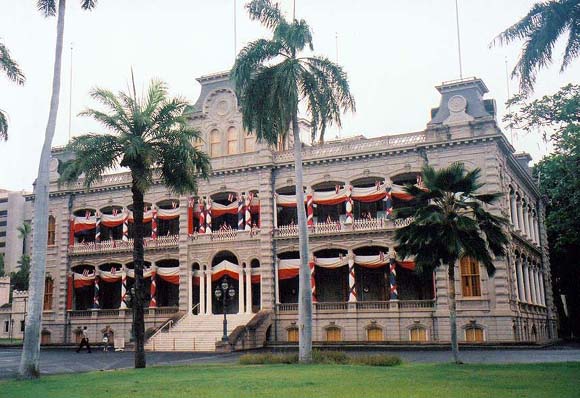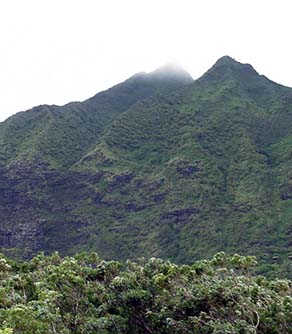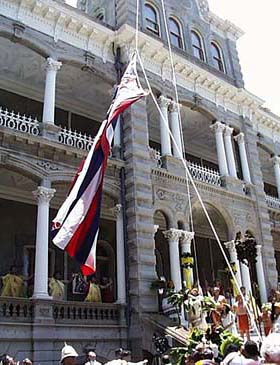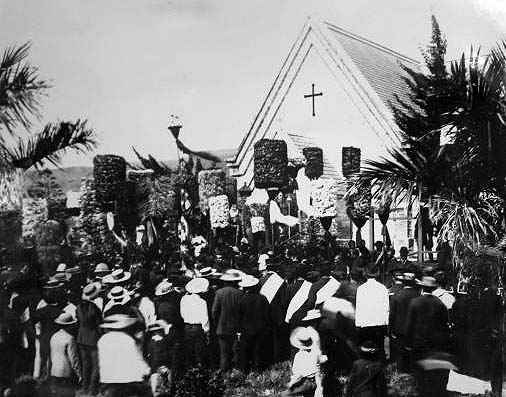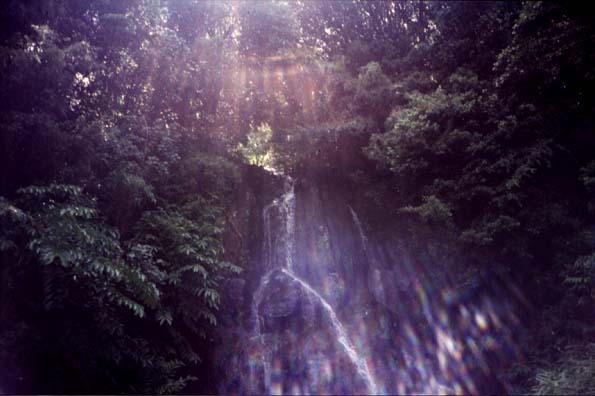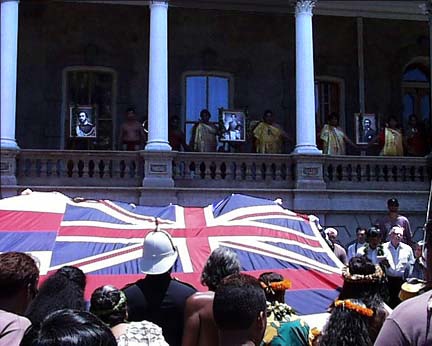 |
 |
 |
|||||||||||||||||||||
|
|
|
|
|
|
|
|
|
||||||||||||||||
|
|
|||||||||||||||||||||||
|
|
|
|
|
| As we depart Nu‘uanu, we ask our guides to share their final thoughts with us, reflecting on all that has been presented here regarding Nu‘uanu. And since Nu‘uanu is intimately tied to the legacy of the Hawaiian Kingdom, our guides reflect on the future of Hawai‘i as a nation.
|
||
|
|
||
|
Stephen Kubota: "I would subscribe to the idea that the kingdom kind of got frozen in time in 1893. And various attempts to revive it basically failed. Now I use the metaphor of the milk carton -- you know, the child missing for 20 years? They do a computer-generated projection of what that person might look like today. I would subscribe to that sort of approach. There’s the kingdom in 1893; these are the things that were happening. If we were to do a projection forward, what would it look like today? I would see it as a very modern society, high tech, but also very environmentally stable. "Those values that were built in from the various in-migrations from Polynesia, to the European contact, to American takeover -- all those forces were part of history and would have created an evolved system. In a way we’re talking about adaptive radiation of culture and society."
|
|
|
|
"I think sovereignty can be achieved but I think it’s a matter of defining what that is. And I stick to what I call the foundation of sovereignty which is subsistence, the idea that as long as you can provide for yourself and your family off the land you are sovereign. That’s the fundamental notion of sovereignty. So I would phrase it in those terms. We have the resources here. We have fresh water, we have land that’s rich, we have an ocean full of fish. We’ve lost it because of mismanagement, but if we restore it we regain our sovereignty in the most fundamental way. "And that foundation -- which will require tapping into the knowledge of the indigenous peoples -- sets the whole basis for whatever the political sovereignty entails. In that sense, I see the Ahupua‘a Action Alliance as working to build the foundation, or restore the foundation, for sovereignty--whatever form that would take. What that looks like, I can’t tell you." Aloha, Stephen.
|
|
|
|
|
|
||
|
Jim Bartels: “When you look at the actual potential of a king
like Kamehameha IV, had he been born into a more hospitable era, Hawaiian
history would have been very different. The tragedy was that the ali‘i
who ruled Hawai‘i in the Western era were so good, but the world
was so unready for what they were. They really didn’t have much
of a chance. Bill Maioho: “Lots of times I think, the Kingdom didn’t survive, but lots of cultural aspects of ourselves did.”
|
||
|
|
||
|
|
||
|
Kalani: "I think it’s inevitable, it’s our heritage to be independent and have our own form of government, and I believe we will again. And I believe that it will be very different from what especially a newcomer coming from America, or any other place, would find. Because, we will not want rules and procedures that we must follow that violate our culture’s rules and procedures. Now American or Western rules do violate ours. And right now the Hawaiians are being terribly tolerant, and say well, 'Consider these cultural rules; adapt them to yours.' Which I think makes the other guy happy, but it isn’t really going to solve, in the long run, our situation. It’s a step forward, but its not the true solution. "We need to decide what culture we’re going to follow here, in Hawai‘i. The two cultures, Western and Hawaiian, are polar opposites. So I know I’m part of the sovereignty movement because I don't want to have to follow somebody else’s culture that’s diametrically opposed to mine, and that dictates to me ways that are totally opposite to the way I want to either live, or speak, or understand things. So that’s why I’m in this movement. "Other people are going to have to make that decision. I know Hawaiians are making it, and others who come to Hawaii to live, they’re going to have to either make the decision that they’ll follow what Hawaiians do, or if they don’t want to, they can certainly live elsewhere And I don’t mean that negatively. I mean they have a broad choice of places to live, that do follow their culture. Hawaiians do not. This is it. So if they don’t want to either learn or choose to follow ours, they can easily go elsewhere. "This is a broader scope of addressing Hawai‘i that also has to take place in this little valley where I live. And I always come back here to get sustenance. I’m always so relieved at the end of the day that I have this to come home to, that there’s Nu’uanu. It is just so sacred and spiritual to me." Aloha, Kalani.
|
||
|
|
||
|
|
||
|
Mel Kalahiki: "The United States dictated to us what is good for us, not letting us have the privilege of determining that. We were a kingdom, a nation with treaties with foreign countries. We had embassies in various parts of the world. Our monarchs were received in courts around the world. All of that was taken away. "You know the meaning of hewa? For me, the hewa is when the United States landed troops over here without permission, on the pretense that they were going to watch over the Americans that were living here. The troops went to the palace, yet the Americans were living up in Nu'uanu. The troops never went to Nu'uanu. They were there to harass the Queen. To add to the stressful situation. So, the hewa was when they landed the troops. They are still here, illegally occupying Hawai'i. "Nu'uanu is a very important place. It played a major part in our history. Of course, as you know, it was the breadbasket for Honolulu in the ancient days. When the westerners came, all of that changed. Their way was to destroy the ancient system. And so a thousand years of history changed. With the western concept of 'developing' came highways, high rises, and social problems. "And yet when you look at Nu'uanu and know its history, you can understand the level of Hawaiian culture. The beauty of our culture. Hawaiians lived in this beautiful environment and they adapted to it with a culture that most people do not know. I wish more people knew our culture. The only part they are familiar with is through 'entertainment,' and quite often that is inaccurate. My hope is that people will come to know the history, the stories, the chants. They will see the beauty and depth of our culture. "Today, in the 21st century, our youngsters are learning their language and their history. My generation was denied that. I look forward to a future that brings back our nation. My goal is to have it happen in my lifetime." Aloha, Mel. Aloha a pau loa.
|
||
|
|
||
| |
| |
|
|
 |
| Nu‘uanu Home | Map Library | Site Map | Hawaiian Islands Home | Pacific Worlds Home |
|
|
|||
| Copyright 2003 Pacific Worlds & Associates • Usage Policy • Webmaster |
|||
